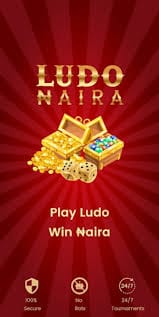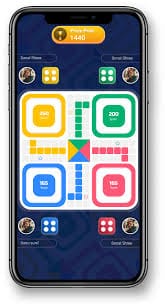Ludo Naira
Ludo Naira is a vibrant, mobile-based reinvention of the timeless board game Ludo, blending nostalgic gameplay with the thrill of real-money rewards. Developed by Get Moore Services Ltd., this online multiplayer game has captured the attention of players across Nigeria, offering a fast-paced, skill-based experience that transforms a childhood favorite into a competitive platform with cash prizes. This article explores the origins, mechanics, appeal, criticisms, and cultural impact of Ludo Naira, highlighting why it’s become a sensation in the world of mobile gaming.

Origins and Concept
Ludo Naira emerged in August 2024 as part of a growing trend of real-money gaming apps that gamify traditional games for modern audiences. Built on the foundation of Ludo—a dice-and-race game with roots in the ancient Indian game Pachisi—Ludo Naira reimagines the classic for the digital age. Available on Android through platforms like Google Play and APKPure, the game targets Nigerian players, capitalizing on Ludo’s cultural significance in the region. Its developers aimed to combine the familiarity of Ludo with the excitement of cash rewards, creating a skill-based platform where strategic play can lead to tangible earnings.
The game’s launch coincided with the rise of mobile gaming in Nigeria, where affordable smartphones and widespread internet access have fueled demand for accessible entertainment. Ludo Naira Pro, a premium version, enhances the experience with a polished interface and faster matchmaking, appealing to both casual players and competitive gamers. By offering daily bonuses and multiplayer competitions, the app taps into Nigeria’s vibrant gaming culture, making it a standout in the casino game category.
Gameplay Mechanics
Ludo Naira adapts the traditional Ludo rules into a 10-minute, fast-paced game available in 2-player and 4-player modes. Unlike classic Ludo, where tokens start locked in a “nest” and require a six to move, all tokens in Ludo Naira begin in an open position, eliminating wait times and diving straight into action. Each player has 15 seconds to make a move, and failing to act three times results in removal from the game, ensuring a brisk pace.
The game introduces a unique scoring system to determine winners. Moving a token one space earns 1 point, while reaching the central “home” space grants a 56-point bonus. Capturing an opponent’s token by landing on their space sends it back to the start, stripping its points, while the capturing player gains a strategic edge. At the end of 10 minutes, the player with the highest score wins, with cash prizes awarded based on performance. This scoring twist shifts the focus from solely racing to home to a balance of strategy, point accumulation, and opponent disruption.
Ludo Naira uses two six-sided dice, with rolls determining movement. The game emphasizes fair play, with developers asserting that dice outcomes are random and not manipulated, though some players have raised concerns about perceived biases. The app’s user-friendly interface and compatibility with Android 5.0+ devices ensure accessibility, while its small 10.1 MB size makes it easy to download even on low-end smartphones.
Why Ludo Naira Appeals
Ludo Naira’s popularity stems from its fusion of nostalgia and modern incentives. Ludo is a cultural touchstone in Nigeria, often played at family gatherings or during festivals. By adding real-money rewards, the game taps into this familiarity while offering a chance to earn money from home, appealing to a wide demographic. The multiplayer format fosters competition, with players across Nigeria vying for cash prizes in quick, engaging matches.
The game’s accessibility is a major draw. Its low system requirements and no-download options on some platforms make it playable on most devices. Daily bonuses and tournaments keep players engaged, while the promise of instant payouts—as noted by some users—adds excitement, though not without controversy. The 10-minute game duration suits busy schedules, making it ideal for casual play during commutes or breaks.
Social interaction enhances the experience. While the game lacks in-game chat, suggestions for features like friend lists and challenge modes reflect a desire for deeper connectivity. The competitive environment, where players can outsmart opponents through strategic captures, adds a layer of skill-based excitement, distinguishing it from purely luck-based games.
Criticisms and Challenges
Despite its popularity, Ludo Naira has faced significant criticism. Many players report network issues, with frequent disconnections or “weak network” warnings even on strong connections, often occurring when they’re winning. This has led to accusations of unfair gameplay, with some claiming the app manipulates dice rolls to favor certain players or bots. Others have reported issues withdrawing earnings, particularly after tournament wins, citing “suspicious activity” flags or unresponsive customer support.
User reviews on Google Play highlight frustration with the app’s stability, with complaints about freezes, unfair matchmaking, and low payouts relative to entry fees (e.g., winning 1000 Naira after staking 500 Naira in a 4-player game). Some players label the app a “scam,” alleging that initial wins lure players into depositing money, only for losses to mount. Developers counter that there are no bots, emphasizing a fair play system and encouraging players to contact support via email ([email protected]) or WhatsApp (+234 9049098622). However, reports of unresponsive support have fueled skepticism.
These issues highlight the challenges of real-money gaming, where trust and transparency are critical. While the developers claim to prioritize security and fairness, addressing network stability and payout concerns could enhance the game’s reputation.
Educational and Cultural Impact
Ludo Naira offers subtle educational benefits. The scoring system encourages strategic thinking, as players balance advancing tokens with capturing opponents’. It also reinforces basic math skills through point tracking and dice addition, making it appealing for younger players under adult supervision. The game’s time limit fosters quick decision-making, a valuable skill in competitive settings.
Culturally, Ludo Naira taps into Nigeria’s love for Ludo, evoking childhood memories while modernizing the experience. Its online multiplayer format connects players nationwide, fostering a sense of community. Social media discussions on platforms like Nairaland highlight its popularity, with threads exploring how to earn money through the game, though some warn of risks due to its real-money nature.

Conclusion
Ludo Naira redefines a classic board game for the digital era, blending nostalgic gameplay with the thrill of cash rewards. Its fast-paced, skill-based mechanics and accessible design have made it a hit in Nigeria, with over 1.1 million downloads since its launch. However, network issues and concerns about fairness underscore the need for improvements to maintain player trust. As a cultural and competitive phenomenon, Ludo Naira proves that traditional games can evolve to captivate modern audiences, offering a thrilling mix of strategy, luck, and rewards. For those seeking a nostalgic yet profitable adventure, Ludo Naira delivers—provided its technical kinks are addressed.
